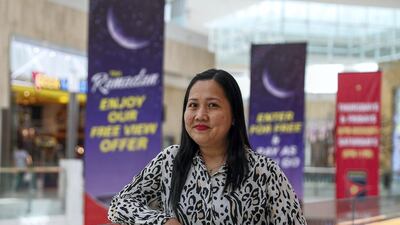Lalaine Blanco lost her son and her husband in the 10 years she has lived in the UAE, but she says Ramadan has helped her to persevere.
Ms Blanco, 40, is a member of the Church of Christ, but says seeing Muslims come closer to God in the holy month also increases her bonds with God.
She left her sons Joshua, 5, and Jhon Carlo, 7, behind in the Philippines with her husband to work for two Emirati families on the outskirts of the city in Beda Zayed.
After a year of working in Abu Dhabi, she had a call from her family telling her that her youngest boy had fallen on his head while playing in school. Soon after, Joshua died of a brain haemorrhage.
Ms Blanco rushed home and discovered her husband had been having an affair with a woman who had since become pregnant.
She had lost her son and husband for whom she had moved to the UAE to financially support.
_______________
Read more:
My Ramadan: An expat fasts for understanding
Discovering the true meaning of Ramadan
_______________
“I came here to help him and he used that as an excuse to cheat,” she says. “I now live for my remaining son Jhon Carlo,” who is now 17.
When she returned to the UAE from that visit, it was Ramadan.
“It was so peaceful in the afternoons and seeing how all the Muslims were close and devoted to God strengthened my own relationship with God,” she says.
“I don’t miss Joshua during Ramadan. He is always with me and I miss him all the time but Ramadan helped me get through the pain.”
The month is not without its challenges for domestic workers, who work hard to prepare feasts for fasting families.
But Ms Blanco says that unlike many housemaids, she loves Ramadan.
“I love it because of all the sweets,” she says. “Oh, and the Vimto, which I only see during Ramadan. Why only Ramadan? It should be all year.”
She says that when she arrived in the UAE she had never heard of Ramadan.
“When I first came I heard all the Filipinas and Indonesians complain about Ramadan,” she says. “‘Wait and see. You will not sleep and there is too much work’.”
“At every house, all the Indonesian and Sri Lankan cooks and Filipino maids complain all the time about Ramadan. For me it is the same as the rest of the year. Only the hours change. I work at night instead of the day.
“But I am lucky. It is because my job is to take care of the kids and not cook.”
Iftar, to Ms Blanco, is a bit of a conundrum.
“Why is there so much food? Everywhere there is food and then it gets thrown in the garbage at the end of the day. Isn’t that haram?” she asks.
“And the biryani and harees. Why is it biryani and harees every day? I can’t eat that every day.”
But a large variety of sweets compensate for the repetition: “So many different kinds.”

